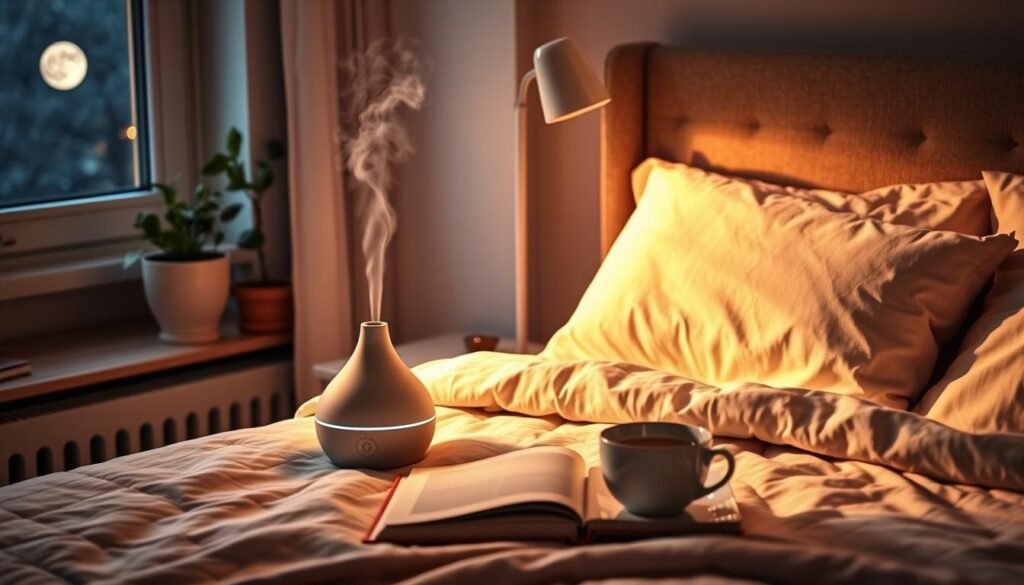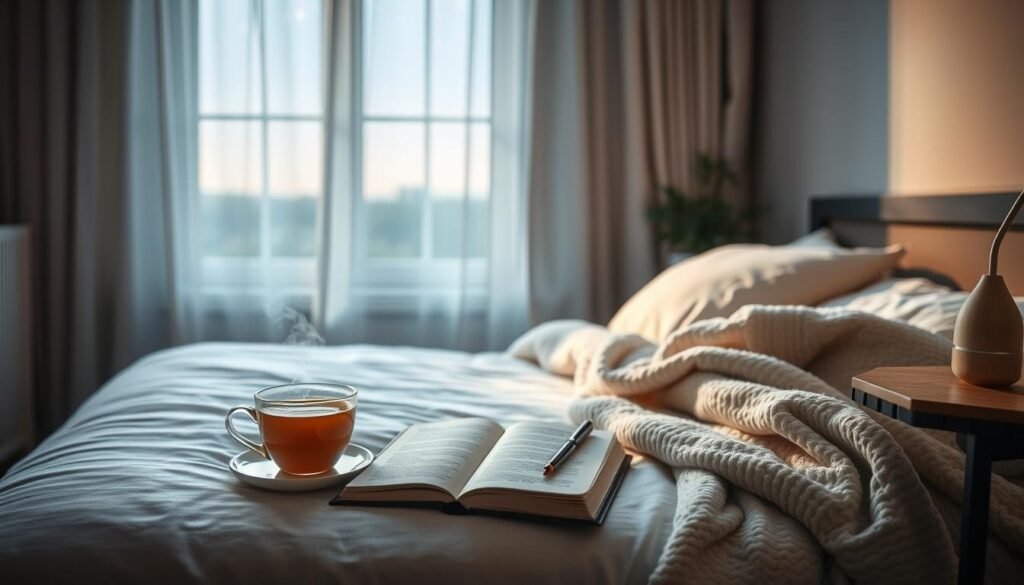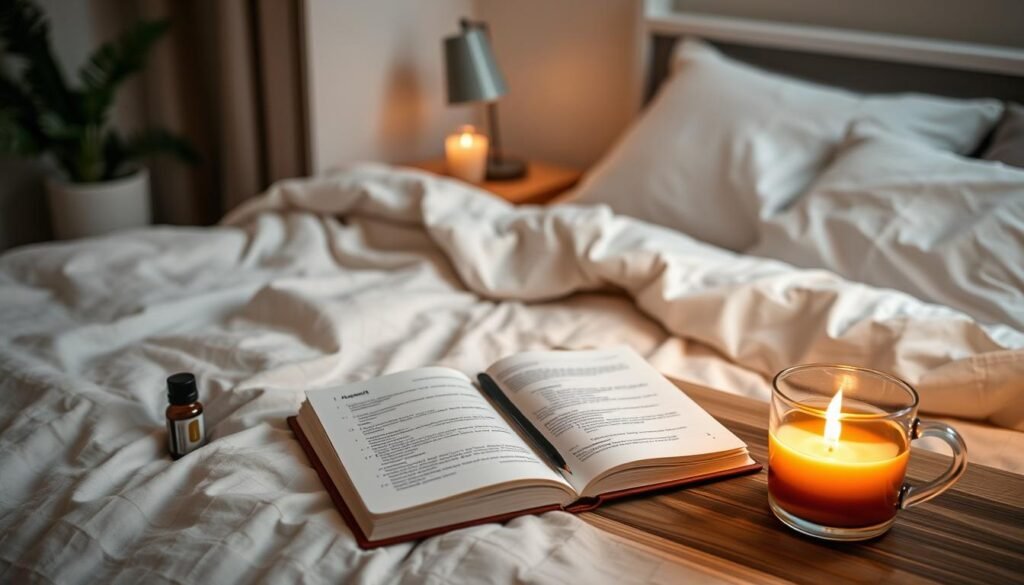Did you know a regular bedtime routine can boost sleep quality by 70%? It can also cut anxiety levels a lot. About one in four people struggles to sleep well. Having a nightly routine is really important.
For those dealing with nighttime anxiety, finding ways to relax before bed is key. Spending 30 to 60 minutes on calming activities can help. It tells your brain it’s time to relax and get ready for sleep. Adopting these habits can tackle stress and make evenings peaceful.
Key Takeaways
- A consistent bedtime routine can improve sleep quality significantly.
- Regular nighttime rituals can reduce anxiety by up to 60%.
- Engaging in relaxing activities before bed can signal the body to wind down.
- Addressing nighttime anxiety leads to better mental health and overall well-being.
- Incorporating soothing practices into one’s evening can lay a foundation for restful sleep.
Understanding Anxiety at Night
Nighttime anxiety can show up in different ways. You might find your thoughts racing or feel physical symptoms that stop you from relaxing and sleeping. You might feel restless, have headaches, or notice your heart beats faster. All these can make it hard to fall asleep. Stress from work, bad experiences, and poor sleep patterns can make this worse. When anxiety affects sleep, it can create a bad cycle. This cycle makes anxiety even worse the next day.
The link between sleep and anxiety is not simple. Not getting enough sleep can make you more anxious. Things like getting sick or losing someone can make anxiety stronger. This might lead to more serious anxiety issues for some. Genetic factors can also play a role, making some people more likely to feel anxious after a bad experience. Plus, certain medicines and caffeine can cause feelings similar to anxiety.
Children who go through tough times might face more panic attacks or constant worry as adults. Anxiety can make the body react with stress, causing discomfort. This makes it hard to sleep. Without the right help, nighttime anxiety can really mess with sleep. Trying out relaxation methods or setting up a calming bedtime routine can help handle these symptoms.
Looking into how deep sleep changes anxiety levels shows why good sleep habits are crucial. People who have trouble sleeping may worry more about not being able to fall asleep. This worry makes their anxiety even worse. Creating a peaceful place to sleep and a steady bedtime routine can really improve how well you sleep and feel overall.
| Type of Anxiety | Common Symptoms | Potential Triggers |
|---|---|---|
| Generalized Anxiety Disorder | Restlessness, fatigue, difficulty concentrating | Stress, trauma, genetics |
| Panic Attacks | Increased heart rate, shortness of breath, trembling | Phobic situations, stressful life events |
| Post-Traumatic Stress Disorder (PTSD) | Flashbacks, nightmares, severe anxiety | Traumatic events, chronic stress |
What Causes Anxiety Before Bedtime
There are many causes of nighttime anxiety. Stress before bedtime can make it hard to calm down. People often worry about their day, personal issues, or past experiences. Also, some people are more likely to feel anxious at night because of their genes.
The link between insomnia and anxiety is like a cycle. The worry of not being able to sleep can make anxiety worse. This fear leads to insomnia, adding to the problem. Not getting enough sleep can then cause more anxiety, making a peaceful night seem impossible.
Lifestyle factors also play a role in bedtime anxiety. Drinking caffeine or using screens before bed can make it worse. For those with anxiety disorders, the struggle is even more significant. Studies show that up to 36% of people with sleep issues also have these conditions.
Knowing what causes this anxiety can help tackle the issue. For serious cases, getting help from a therapist is key. They can offer strategies to improve sleep and reduce anxiety.
The Role of a Bedtime Routine in Reducing Anxiety
A structured bedtime routine helps reduce anxiety. By doing regular activities, individuals tell their bodies it’s time to relax. This helps them feel relaxed and creates a comforting bedtime atmosphere.
How Bedtime Routines Signal Relaxation
Calming activities right before bed signal to your mind and body that it’s time to sleep. Activities like reading a book or drinking chamomile tea help you calm down. Studies show that people with bedtime routines sleep better and have less trouble sleeping.
Physiological Effects of a Consistent Routine
Following a set routine before bed can help your body prepare for sleep. A consistent bedtime helps with melatonin production, which is needed for sleep. Also, keeping the room cool and avoiding caffeine at night can make you more comfortable and relaxed. Adding yoga and meditation can also decrease anxiety, highlighting how important bedtime routines are for anxiety reduction.
Benefits of a Bedtime Routine for Mental Health
A bedtime routine can do more than just improve your sleep. It greatly boosts your mental health by making you less anxious and helping you handle your emotions better. Having a regular schedule helps your body and brain get ready to sleep deeply. Deep sleep is key for thinking clearly.
Improved Sleep Quality
Getting better sleep is vital for your mental well-being. Sticking to a nightly routine helps you fall asleep faster and wake up feeling refreshed. This kind of sleep helps you deal with stress better and reduces bedtime routine anxiety. It’s also great for people in recovery, as it builds stability and boosts self-esteem.
Enhanced Emotional Regulation
Having a bedtime routine helps you manage your feelings better. It lowers stress and improves your choices. This stability is comforting, especially for kids and those feeling vulnerable. A regular bedtime routine can make you less lonely and more content, which is key for good bedtime routine mental health.

| Benefits | Description |
|---|---|
| Better Sleep Quality | Facilitates falling asleep quickly and maintaining deeper sleep stages. |
| Improved Emotional Regulation | Enhances the ability to cope with stressors and manage emotions effectively. |
| Lowered Anxiety Levels | Consistent routines lead to reduced feelings of anxiety and increased relaxation. |
| Increased Sense of Control | Having a bedtime routine fosters a feeling of stability and control over one’s environment. |
| Enhanced Cognitive Function | Regular rest improves decision-making and critical thinking abilities. |
Creating an Effective Bedtime Routine
An effective bedtime routine is key to less anxiety and better sleep. It involves a steady sleep time and relaxing before bed. These steps tell your body it’s time to rest, improving your mental and physical health.
Deciding on a Consistent Sleep Schedule
Having a regular sleep schedule is crucial. Going to bed and waking up at the same time helps your internal clock. This makes your sleep better. Keeping this routine even during weekends is important. Without it, your sleep could be off, making it hard to unwind at night.
Incorporating Relaxation Techniques
Choosing how to relax before bed helps. Meditation, stretching, or drinking chamomile tea can lower your anxiety. These calming activities create a restful space. Adding things like dimming lights and reading makes it easier to fall asleep.
A good list of relaxation techniques includes:
- Meditation or mindfulness exercises
- Light stretching or yoga
- Listening to calming music or nature sounds
- Taking a warm shower or bath 90 minutes before bedtime
| Technique | Description | Benefits |
|---|---|---|
| Meditation | Mindfulness practices to calm the mind. | Reduces stress and enhances relaxation. |
| Light Stretching | Gentle exercises to relax muscles. | Promotes physical relaxation and reduces tension. |
| Warm Bath | A relaxing soak before bed. | Improves sleep quality by raising and lowering body temperature. |
| Calming Teas | Herbal teas such as chamomile or peppermint. | Helps to soothe the body and mind. |
Bedtime Routine Tips for Anxiety Reduction
Creating a nightly routine can help lessen bedtime anxiety. Simple and effective tips can make going to sleep easier. These include limiting screen time and making your sleeping area more calming.
Limiting Screen Time Before Bed
Cutting down on screen time before bed is key. Devices emit blue light which can keep you awake by disrupting melatonin. Instead, try relaxing activities like reading, which can lower stress by 50% in just six minutes.
The Importance of a Calm Environment
A soothing sleep environment improves sleep and lowers anxiety. Use soft lighting, cozy bedding, and keep the room cool. This turns your bedroom into a restful retreat.
Decluttering adds to safety and relaxation, aiding nighttime anxiety reduction. Dark, quiet settings along with good sleep habits are beneficial. Having a consistent routine helps manage daily life, aiding mental health.

Relaxation Techniques to Include in Your Routine
Adding relaxation techniques to your bedtime routine can help manage anxiety. Mindfulness and deep breathing let you focus on now, easing worry and fear. These methods make your surroundings peaceful and help you fall asleep easier.
Mindfulness and Deep Breathing Exercises
Mindfulness exercises make you more aware of the current moment. They help you push aside anxious thoughts, bringing calm. Deep breathing, like diaphragmatic breathing and the 4-7-8 method, triggers your body’s calm response. It’s important to do these regularly for them to work well at bedtime.
Progressive Muscle Relaxation and Stretching
Progressive muscle relaxation involves tensing and relaxing different muscle groups. It eases physical tension and stress. This method also makes you more aware of how your body reacts to anxiety. Gentle stretching helps relax your muscles further, making it easier to sleep. Both are great for improving your sleep and well-being.
| Relaxation Technique | Description | Benefits |
|---|---|---|
| Mindfulness | Awareness of present thoughts and feelings. | Reduces anxiety and enhances emotional regulation. |
| Deep Breathing | Controlled inhalation and exhalation. | Calms the nervous system and lowers stress levels. |
| Progressive Muscle Relaxation | Tensing and relaxing muscle groups sequentially. | Helps identify and alleviate muscle tension. |
| Stretching | Gentle elongation of muscles. | Promotes blood circulation and overall relaxation. |
Using these relaxation techniques at bedtime can make a stress-free environment that improves sleep. Different techniques work better for different people. Trying out several options is key. Regular practice is important for reducing anxiety and getting better sleep.
Journaling and Planning for Stress Relief
Journaling has become a key way to fight nighttime anxiety. It lets people freely express thoughts and feelings before bed. This activity helps people talk about their day. It’s also great for making plans to reduce stress.
Using To-Do Lists to Clear Your Mind
To-do lists can help organize thoughts and tasks. This makes it easier to see what needs to be done. It also tracks symptoms and fosters positive self-talk, making bedtime more relaxing.
Journaling helps identify what’s causing stress. It allows people to find solutions and lower their anxiety. Writing down tasks for 5 to 15 minutes can bring order to chaos. It also opens up new ways to see old problems.
Freewriting for 15 to 20 minutes can reveal deeper feelings. Keeping a journal handy encourages spontaneous writing. This can help people unwind. Looking back on good times can also help deal with current problems.
Journaling and to-do lists help with managing stress. They make the bedroom a calm place, perfect for sleeping well.

Transforming Your Sleep Environment
Making your sleep space better is key to sleeping well. A well-thought-out area can make you less anxious about sleep and improve how well you sleep. To make your sleeping area calm, think about the room’s temperature, light, and what you can feel, smell, or hear.
Creating a Sleep Oasis: Temperature and Lighting
It’s important to keep your room cool, between 60-67°F, for good sleep. Using dim lights or blackout curtains helps get rid of distractions and relaxes you. Setting up a quiet, peaceful space makes falling asleep easier.
Having the same bedtime routine every night also signals your body it’s time to rest. Making these simple changes can really help change your sleep space for the better.
The Role of Aromatherapy and Sound
Using aromatherapy can improve relaxation at bedtime. Essential oils like lavender help calm you down. You can use a diffuser or pillow spray to bring these relaxing smells into your bedroom.
Also, soft sounds, like white noise or nature sounds, can drown out other noises. Together, these elements help create a peaceful place that feels calm and less stressful. This way, you make a bedroom that’s great for sleeping peacefully.
Improving your sleep space is simple. With easy changes like setting the right temperature, using good lighting, and adding things that please your senses, you can create a perfect sleeping area. For tips on dealing with sleep anxiety, check out this guide on sleep anxiety management.
Conclusion
A good bedtime routine is a key to fighting off nighttime anxiety. Studies show that using relaxation techniques, improving your sleep space, and journaling help a lot. These steps lead to better sleep and mental health benefits.
An organized nighttime routine equals deeper sleep and fewer wake-ups. A study with 405 moms and kids showed those with routines had fewer sleep problems. Their sleep started faster and was more continuous. This proves how crucial a good bedtime routine is for easing anxiety and ensuring restful nights.
Adopting these habits helps not just now but in the long run too. Having consistent bedtime rituals means calmer nights ahead. This leads to improved emotional control and a better life overall.